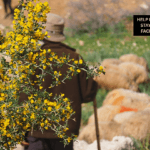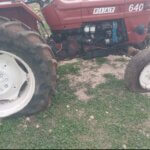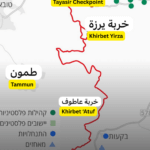Settlement theft of Abel al Ajaaj land
The Abu al Ajaj community live in neat homes made of wood, plastic and sewn-together animal-feed sacks. Mixed in amongst their homes are communal latrines and covered pens for the sheep, goats and other animals.
Settlers steal the land
In November 2008 we came to meet Shahdi and the other residents with a lawyer who was going to represent them in the Israeli courts. We sat in the shade outside his house and he showed us the surrounding homes of his eight grown-up children and his grandchildren.
About 10 m from their buildings, on the other side of a mud track, stood a row of 15–20 greenhouses full of irrigated grape vines. Until 2004 Shahdi’s family had been farming this land. Then settlers from Massu’a came, knocked down his buildings, took the land and put up their greenhouses. He was powerless to stop them.
At the southern end of the settlers’ greenhouses there is a lush green patch of newly planted ground. Shahdi explained to the lawyer that his sheep pens and animal food store stood on this land until July 2008, when settlers from Massu’a appeared one day and told him to leave. The lawyer asked why he allowed this to happen. He responded: because the settler had put a gun to his head, and had brought along the Israeli police and army for back-up.
Demolition orders
Demolition orders were then issued on all his family’s homes. On 17th September 2008, in accordance with Israeli military law, he went to see the Military Administration in Huwwara to appeal against the proposed demolition, but they refused to accept his application. They said: “This is government land and you have to leave it.” This is a common account that we heard from many farmers in the area. When they approach the Israeli authorities they are rebuffed and are not even permitted to have their applications against land confiscations and demolitions orders recorded.
Determined to resist this injustice, they the Abel al Ajaj comunity have employed a surveyor to prepare a detailed plan of the land, which they will use to support their case against land confiscation and demolitions in the Israeli courts.
Water, harassment and pressure to leave
Theft of land and demolition orders are just the latest tactics used by the Israelis to pressurise this particular Palestinian community to leave.
It is getting harder and harder for them to raise their sheep, and the common land on the mountains where they used to graze their 200 sheep has gradually been taken over by the Israelis, so they now have to keep their sheep in pens and buy 90% of the food for them.
Their access to water has been severely restricted. In previous years they had a permit to install a water pipe, but the IOF have since demolished it. It now stands as a rusty reminder of how they could have piped water, rather than having to take tractors and portable tanks to collect their water every day.
Pressure to leave is mounting. The green ornamental trees at the entrance to Massu’a settlement are only about 100 m away. An army base is about 1 km along the road. The settler cars and army jeeps pass by constantly. Sometimes the settlers come on foot, claiming that the sheep and other animals smell and threatening that they will have to go.
Struggling for survival
Abel al Ajaaj is in Al Jiftlik, a large village in the centre of the Jordan Valley dating back to Ottoman times, when it was named ‘the Sultan’s land’. The heart of the village has now been torn out by the creation of Israeli Closed Military Zones and settlement farms. Small pockets of the land are in Area B, but the vast majority is Area C, giving Palestinians no rights or security.
Abel Al Ajaaj area
From 1948 to 1967 a refugee camp stood on this land, but directly after the occupation in ‘67 the Israeli Occupation Authority destroyed the camp and levelled the land, leaving no trace of it. The land laid bare until 1979, when several families came from their homes in Yata’ near Hebron, ironically themselves refugees. Their land had been taken by settlers and they could no longer sustain themselves. Some of the land they now live on was common land from the days of Jordanian rule in 1948–1967. The rest is owned by a Palestinian landowner who gave them permission to use the land.
Massu’a settlement
Massu’a grows produce for export for Carmel Agrexco and other Israeli companies, some of which will inevitably be sold to supermarkets in Europe. Whilst pressurising the community at Abel Al Ajaaj to leave the settlement employs other Palestinians to work in the packing houses and fields, knowing that the destruction of the Palestinian economy, and the restrictions on access to water and land, has turned much of the Palestinian population into a cheap servile workforce for the settlements.
Later the same day we met two men from Tubas. They have both worked for Massu’a settlement for more than 20 years. They both have families to support, yet they do not have contracts, do not get sick pay, and receive only 90 shekels (about £13) per day. Each day they have to travel through Hamra checkpoint to get to work, which means leaving at 3 am or 4 am in the morning to allow for being held up at the checkpoint. If they arrive late, they have to work extra time at the end of the day.






